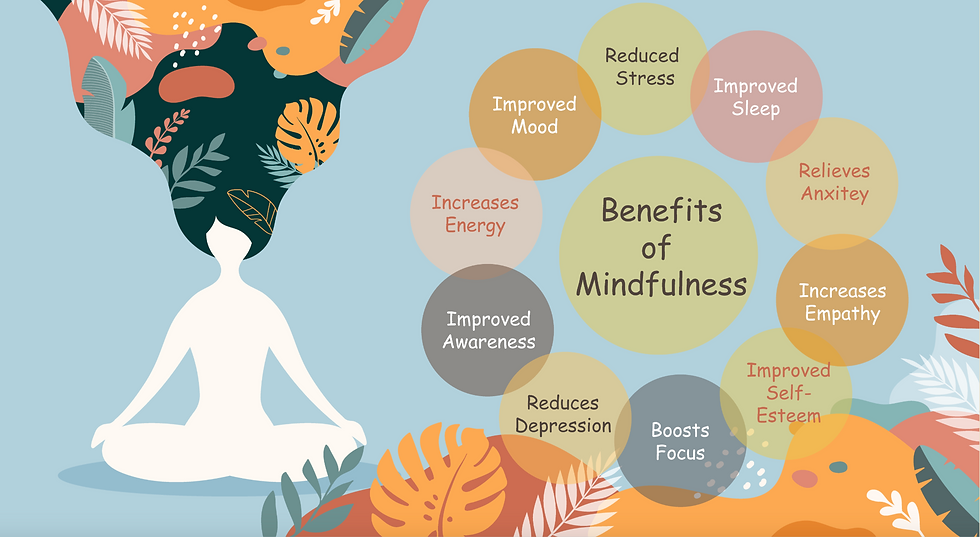Exploring the Benefits of Mindfulness
- Deborah Pleasants
- Nov 23, 2024
- 4 min read
Updated: Mar 15, 2025
Mindfulness is a mental state attained by concentrating one's attention on the current moment, free from judgment. It involves being completely conscious of your thoughts, emotions, sensations, and environment. You come to understand that emotions are constantly changing and also tend to lessen. During this process, you can approach the experience with curiosity and compassion instead of criticism or avoidance. Mindfulness consists of three primary elements:
Emphasizes the present moment. It involves grounding attention in the here and now instead of getting caught up in thoughts about the past or future.
Non-judgmental observation encourages individuals to observe their thoughts and feelings without labeling them as good or bad.
Acceptance supports embracing one's experiences, whether pleasant or unpleasant, without resistance.
Most of the time our perception is limited by our attention span; fragmented by continuous distractions; distorted by our biases, assumptions, and expectations; and regularly hijacked by our emotional reactivity. Mindfulness is the capacity to perceive our world clearly, without adulteration or manipulation

Benefits to Mindfulness
Stress reduction - Mindfulness can help regulate the nervous system to feel calmer in both body and mind. Regular practice promotes resilience, making individuals better equipped to handle challenges. People who engage in mindfulness often describe enhanced feelings of relaxation and balance in their lives, significantly improving overall well-being, both mentally and physically.
Increased self-awareness - By virtue of paying close, nonjudgmental attention to one’s inner world, one is more responsive to their own emotions and therefore able to respond to situations, events, conflicts or one’s inner critic with choice and emotional regulation rather than reactivity.
Improved focus - Whilst we live in a world filled with constant distraction one of the key advantages of mindfulness is enhancing focus. By concentrating on the present, individuals can enhance their concentration and attention span. Grounding exercises help eliminate mental clutter, leading to greater clarity. This is particularly beneficial for decision-making and fostering a sense of control.
Improved interpersonal relationships - The impact of mindfulness on relationships can be profound. It cultivates better listening skills and communication, fostering deeper connections with others. By practicing being fully present with our loved ones, we can create spaces for authenticity and empathy.
Benefits of Mindfulness in Counselling Sessions
Mindfulness serves as an effective method for transforming the brain's neural pathways. The brain is always changing and adjusting, and mindfulness leverages this neuroplasticity. Engaging in mindfulness practice improves neural connections associated with focus, concentration, and emotional regulation. With regular practice, one can build your mental strength and boost overall well-being. While mindfulness may be challenging, particularly at the start, trust me, the advantages are substantial and can greatly improve one's quality of life. When appropriate I incorporate guided imagery, meditation, breathing exercises, or mindful observation into my counselling sessions. I customise the exercises to suit my client's needs and below are some examples of the techniques I employ:
Mindful meditation - entails watching thoughts and emotions without judgment. It is especially advantageous for clients displaying busy, critical, avoidant, or indecisive behaviors. I use mindful meditation to help clients connect with themselves and delve into their inner world. This practice can improve self-awareness, clarity, and assist in regulating and balancing the nervous system.
Breathing Exercises - serve as an effective method for regulating a disregulated nervous system. Breath acts as the link between life and consciousness, uniting the body and thoughts. By engaging in particular breathing techniques, individuals can soothe their body and mind, alleviate stress, and encourage relaxation. I particularly recommend breathing exercises for clients dealing with anxiety, overwhelm, and insomnia.
Body scan meditation - is a mindfulness practice that focuses attention on various parts of the body, one by one. This technique is a potent method for relaxing the body and fostering a profound connection between the mind and body. I employ body scans to help clients relax, especially those who are highly cognitive and disconnected from their physical selves. Body scans can prompt individuals to experience their feelings instead of evading them through constant thinking or intellectualizing.
Guided Imagery - is an effective method that uses imagination to form soothing and uplifting mental pictures. I frequently encourage clients to envision their “safe place.” This involves picturing a serene and calming location, like a beach, forest, or mountaintop, or any place the client wishes to imagine. It is a method that enables a person to establish a mental refuge to retreat to whenever feeling stressed, anxious, fearful, or overwhelmed.
Engaging with Your Inner Child - Mindfulness exercises targeting the inner child seek to build a link with one's younger self. These practices can help heal past emotional wounds and nurture a more compassionate relationship with oneself. This process can be profoundly emotional and impactful, often helping to address unresolved childhood issues.
Journaling - Recording thoughts, emotions, and experiences helps in emotional processing and can improve self-awareness and problem-solving. Clients who like journaling find it very therapeutic and often share excerpts during our counseling sessions for reflection.

I am a strong advocate of mindfulness. In our fast-paced and complex world, our minds are constantly racing. We are often burdened with regrets, fears, "shoulds," "musts," and harsh inner critics, This type of thinking causes us to dwell on the past or project into the future, whilst neglecting to live in the present and focus on the truth of the current moment. I have been practicing mindfulness for twenty years. It calms, grounds, and keeps me true to myself. It also aids me to connect with my instincts, and since I tend to intellectualise, it helps me to connect with my body, linking my thoughts, feelings, emotions, and physical sensations.
"In the attitude of silence, the soul finds the path in a clearer light, and what is elusive in the word and in the reason is revealed with surprising ease to quiet intuition." Martin Luther King Jr.

Comments